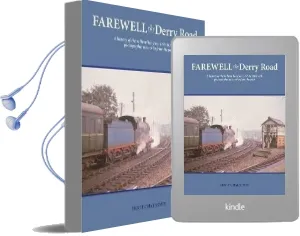Farewell the Derry Road: A History of the Railway Line From 1876 to 1965 With Photographic Memories From the Past [Audiobook] download free by Eric T. Challoner

- Listen audiobook: Farewell the Derry Road: A History of the Railway Line From 1876 to 1965 With Photographic Memories From the Past
- Author: Eric T. Challoner
- Release date: 2010/2/17
- Publisher: COLOURPOINT BOOKS
- Language: English
- Genre or Collection: Transportation
- ISBN: 9781906578763
- Rating: 8.52 of 10
- Votes: 839
- Review by: Vaughn Cavanaugh
- Review rating: 8.21 of 10
- Review Date: 2018/11/3
- Duration: 2H2M31S in 256 kbps (32 MB)
- Date of creation of the audiobook: 2018-08-13
- You can listen to this audiobook in formats: WMA, MP3, MP4, WAV, OGG, AAC, MPEG4, FLAC (compression TAR.7Z, ZIP, RAR, TAR.BZ2, ARC, RPM)
- Total pages original book: 160
- Includes a PDF summary of 17 pages
- Duration of the summary (audio): 13M41S (3.4 MB)
- Description or summary of the audiobook: INTRODUCTION: Sunday 14 February 1965, is a date that will live in the minds of working men and railway enthusiasts alike in Northern Ireland, for on that day, a heavily biased Stormont Government, totally obsessed with road transport and with a barely veiled mandate to remove all forms of rail traction in Northern Ireland, closed the 751/2 mile railway line between Portadown and Londonderry, together with the Dungannon to Coalisland branch, in the process bringing to an end 118 years of travel in County Tyrone. Nominally closed by the Ulster Transport Authority - in reality another arm of the Government - this completed a move first proposed as far back as 1957. Known to all as the 'Derry Road' and one of the most important secondary lines in the province, it provided both a social service and a transport feeder for the local economy that was an essential lifeline for the wellbeing of the market towns and rural communities that it served along its route; its platforms and halts had become important meeting places, with much social significance and importance to the community.Stations like Dungannon and Omagh, that bustled with the sounds of porters' cheerful banter, wicker baskets and sacks being loaded with the slamming of carriage doors, fell strangely silent. The often-played-out scenes of heartfelt 'hellos' and desperately poignant 'good-byes' would not be seen again. Passing places like Trew & Moy or Beragh, and distant Pomeroy, high upon the slopes of the Sperrin foothills, suddenly seemed more remote than before. The final day's UTA workings were operated by ex- Great Northern men in the true spirit of their previous employer. Strong in their beliefs, the timetable was operated faultlessly with the crews determined to go out in style - if they could not stop the closure, they could at least show what they stood for and believed in.The closure, bitterly fought against by Tyrone County Council, and originally planned for 4 January, was postponed following a second attempt by the County Council to force a rethink; their concern regarding the proposed action by the Government was so great that they had taken the unprecedented step of going to the High Court twice in a desperate attempt to stop the closure, stating that they had 'lost all confidence in the Government's ability to deal with their objections in a way which was objective, fair and, in the circumstances, adequate'. Despite the Stormont Government's claim that the line was uneconomic, prodigious amounts of freight continued to be worked along the Derry Road, even in its final years: their subversive and, at times, completely false media statements, contrasted sharply with traffic movements on the line itself. With much of the route being single line, it was necessary to move the bulk of the freight at night, with lodging turns being the norm and signal boxes manned 24 hours a day; such was the volume of traffic on a line alleged to be unprofitable.Strabane, as always, had continued to handle a considerable amount of heavy transhipment freight for the County Donegal Railways network, right up to the end (via their road vehicle fleet after December 1959) and there was a steady stream of 'Free to Free' traffic originating in the Irish Republic and destined for one of the three County Donegal stations between Strabane and Londonderry. One consequence of the closure was that the redundant Derry line BUT railcar sets were redeployed, enabling the elimination of the remaining steam worked diagrams on the ex-GNR lines and thus ensuring an early demise of the steam engines. In a further move that irrevocably damaged railway services, the Government, through the UTA, withdrew all general freight services with the closure of the Derry Road. The substantial block traffic between Dublin and Donegal, formerly routed over this line, was transferred to overnight fitted trains using CIE diesel locos from Dublin as far as Lisburn.From there, totally unsuitable UTA 275 hp multi-purpose diesel railcars (MPDs) replaced the locos, the trains having to reverse at this point and run via the Antrim branch, thence using the ex-NCC main line to Londonderry (Waterside).
- Other categories, genre or collection: Trains & Railways
- Download servers: 4Shared, Hotfile, Dropbox, Mediafire, FilesAnywhere. Compressed in TAR.7Z, ZIP, RAR, TAR.BZ2, ARC, RPM
- Format: Paperback
- Approximate value: 34.43 USD
- Dimensions: 213.36x264.16x15.24mm
- Weight: 612.35g
- Printed by: Not Available
- Published in: Newtownards, United Kingdom





























































































































